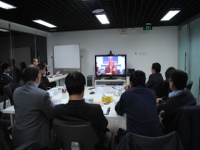Registration
You will receive an email confirming your registration.
IMGXYZ3476IMGZYXNATO was founded as a political and military alliance spanning the Euro-Atlantic region in 1949, with the directive to protect and defend its territory and populations against attack. However, today the Euro-Atlantic region is at peace and the threat of a conventional attack or traditional military attack is low, while the threat of unconventional violence such as terrorism or cyberattacks is on the rise.NATO was founded as a political and military alliance spanning the Euro-Atlantic region in 1949, with the directive to protect and defend its territory and populations against attack. However, today the Euro-Atlantic region is at peace and the threat of a conventional attack or traditional military attack is low, while the threat of unconventional violence such as terrorism or cyberattacks is on the rise.
Carnegie’s global centers in Beijing and Brussels opened a new channel of dialogue by establishing the first direct video link between NATO officials and Chinese scholars, allowing NATO officials to brief Chinese scholars on their newly published Strategic Concept to address the changing international environment. In addition to Carnegie-Tsinghua Resident scholars, Chinese participants also included Li Weiwei of Chinese Institute of International Studies, Zhao Junjie of the Chinese Academy of Social Sciences, Zhang Jian of China Institute of Contemporary International Relations and Zhang Zhizhou of Beijing Foreign Language University. The event was co-moderated by Carnegie-Tsinghua Center Director Paul Haenle and Carnegie-Tsinghua Resident Scholar Shi Zhiqin.
History of NATO
- Original Mission: NATO was originally intended to help the United States and Western Europe prevent possible attacks from the Soviet Union and its allies during the Cold War, NATO officials explained. This mission shifted after the fall of the Soviet Union left a vacuum and created security issues in Eastern Europe.
- Expanding Membership: In the latter half of the twentieth century, NATO began allowing membership in the organization to many of the newly democratic European countries.
- New Threats: NATO helped with many peacekeeping operations in Europe in the 1990s, but in the twenty-first century new threats began to emerge. NATO was forced to reconsider its focus. The organization must learn to adapt as a regional alliance with global security in mind, the officials added.
Cooperative Security
NATO’s new strategy will be a transition to a cooperative security alliance in order to identify and address present and future dangers, the officials explained. The core mission of NATO will remain the protection of its members and territory. NATO remains open to nations seeking membership, though it is not necessarily recruiting new members.
- Key Challenges: Some of the issues that the organization is currently facing include:
- Unstable borders
- Transportation security
- Environmental degradation
- Budget contributions
- Pooling resources
- Nuclear alliance
- Managing NATO’s Responsibilities
- Crisis Management: When it comes to managing crises, NATO recognizes the limitations of military operations and seeks to take a more comprehensive approach, the officials said. To that end, NATO is seeking to improve its counter-insurgency ability and rebuilding efforts. One important factor needed to resolve crises is cooperation between NATO forces and domestic authorities to mobilize resources such as police and intelligence officers.
- Afghanistan: The current situation in Afghanistan reflects the years of international neglect the nation suffered, NATO officials said. The Taliban filled the void left by the international community, and the September 11, 2011 attacks on the United States were a product of Taliban ideology permeating Afghanistan’s borders, they added. NATO’s objective is to create a self-sustaining Afghani government, but this is proving to be a challenge. NATO faces its own inexperience in counter-insurgency operations and a lack of sufficient resources to achieve its objectives. Nonetheless, the officials asserted that the alliance’s commitment to operations in Afghanistan is long-term, asserting that securing Afghanistan will allow for the increased security of Europe. As Afghan security forces gain capability, NATO will play a supporting role and direct action in operations will decrease, the officials concluded.
- Russia: A positive relationship between Russia and NATO is vital if security issues such as a stable Afghanistan and missile defense are to be resolved, NATO officials added. Recent meetings between Russian and NATO officials in Lisbon led to some progress, as Moscow agreed to allow NATO forces to be transported through Russian territory.
Discussants: Li Weiwei, Zhang Jian, Zhang Zhizhou
